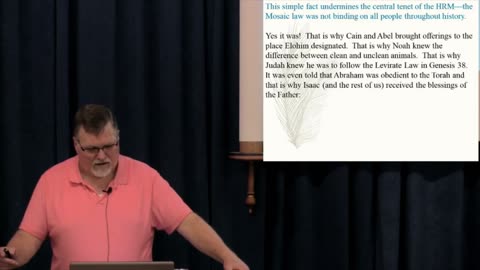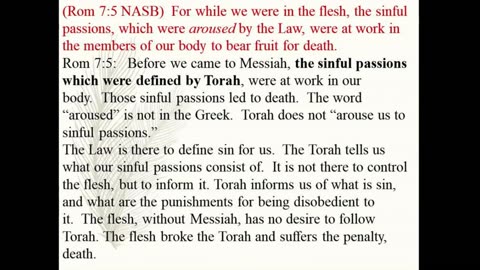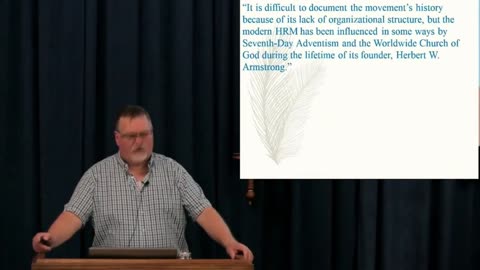
Rebuttal to: Dr. Tim Chaffey and his article "Dangers of the Hebrew Roots Movement."
4 videos
Updated 9 months ago
Rebuttal - Accusations and allegations made by Tim Chaffey. "Dangers of the Hebrew Roots Movement"
Recorded March 26, 2018
The response to the AIG abstract is rather lengthy. In order to address each and every issue, accusation, and allegation made by Tim Chaffey. If one wishes to address one or more of these issues as a time instead of the rebuttal as a whole, contact me.
-
Rebuttal to: Dr. Tim Chaffey and his article "Dangers of the Hebrew Roots Movement." Part 4. 2018
 RVTAIn the video, the words in Blue - Dr. Tim Chaffey Black - Rabbi: Patrick McGuire Red - Bible Men have been twisting the words of Paul and other Scriptures to line up with their pagan and evil traditions. Yeshua warned about forsaking the Torah of Elohim for the sake of man’s traditions. (Matt. 15:3, Mark 7:6-9). (2 Pet 3:17 NASB) You therefore, beloved, knowing this beforehand, be on your guard lest, being carried away by the error of unprincipled men, you fall from your own steadfastness, 2 Pet 3:17: Peter warns us to be on guard lest we be carried away by the error of “unprincipled men.” The Greek word for “unprincipled men” is G113. athesmos, ath’-es-mos; from G1 (as a neg. particle) and a der. of G5087 (in the sense of enacting); lawless, i.e. (by impl.) criminal:–wicked. He is warning us to be on guard lest we be carried away by the error of lawless men that twist Paul’s letters and the rest of Scripture to their own destruction. (2 Pet 3:18 NASB) but grow in the grace and knowledge of our Lord and Savior Jesus Christ. To Him be the glory, both now and to the day of eternity. Amen. 2 Pet 3:18: Peter ends his second letter by telling the readers to grow in the grace and knowledge of our Lord and Savior, Yeshua Messiah. We do that by studying His Torah and living it in our lives, just as He did. With that in mind, let’s look at the passages the author reference's.20 views
RVTAIn the video, the words in Blue - Dr. Tim Chaffey Black - Rabbi: Patrick McGuire Red - Bible Men have been twisting the words of Paul and other Scriptures to line up with their pagan and evil traditions. Yeshua warned about forsaking the Torah of Elohim for the sake of man’s traditions. (Matt. 15:3, Mark 7:6-9). (2 Pet 3:17 NASB) You therefore, beloved, knowing this beforehand, be on your guard lest, being carried away by the error of unprincipled men, you fall from your own steadfastness, 2 Pet 3:17: Peter warns us to be on guard lest we be carried away by the error of “unprincipled men.” The Greek word for “unprincipled men” is G113. athesmos, ath’-es-mos; from G1 (as a neg. particle) and a der. of G5087 (in the sense of enacting); lawless, i.e. (by impl.) criminal:–wicked. He is warning us to be on guard lest we be carried away by the error of lawless men that twist Paul’s letters and the rest of Scripture to their own destruction. (2 Pet 3:18 NASB) but grow in the grace and knowledge of our Lord and Savior Jesus Christ. To Him be the glory, both now and to the day of eternity. Amen. 2 Pet 3:18: Peter ends his second letter by telling the readers to grow in the grace and knowledge of our Lord and Savior, Yeshua Messiah. We do that by studying His Torah and living it in our lives, just as He did. With that in mind, let’s look at the passages the author reference's.20 views -
Rebuttal to: Dr. Tim Chaffey and his article "Dangers of the Hebrew Roots Movement." Part 3. 2018
 RVTAIn the video, the words in Blue - Dr. Tim Chaffey Black - Rabbi: Patrick McGuire Red - Bible Men have been twisting the words of Paul and other Scriptures to line up with their pagan and evil traditions. Yeshua warned about forsaking the Torah of Elohim for the sake of man’s traditions (Matt. 15:3, Mark 7:6-9). (2 Pet 3:17 NASB) You therefore, beloved, knowing this beforehand, be on your guard lest, being carried away by the error of unprincipled men, you fall from your own steadfastness, 2 Pet 3:17: Peter warns us to be on guard lest we be carried away by the error of “unprincipled men.” The Greek word for “unprincipled men” is G113. athesmos, ath’-es-mos; from G1 (as a neg. particle) and a der. of G5087 (in the sense of enacting); lawless, i.e. (by impl.) criminal:–wicked. He is warning us to be on guard lest we be carried away by the error of lawless men that twist Paul’s letters and the rest of Scripture to their own destruction. (2 Pet 3:18 NASB) but grow in the grace and knowledge of our Lord and Savior Jesus Christ. To Him be the glory, both now and to the day of eternity. Amen. 2 Pet 3:18: Peter ends his second letter by telling the readers to grow in the grace and knowledge of our Lord and Savior, Yeshua Messiah. We do that by studying His Torah and living it in our lives, just as He did. With that in mind, let’s look at the passages the author reference's.27 views
RVTAIn the video, the words in Blue - Dr. Tim Chaffey Black - Rabbi: Patrick McGuire Red - Bible Men have been twisting the words of Paul and other Scriptures to line up with their pagan and evil traditions. Yeshua warned about forsaking the Torah of Elohim for the sake of man’s traditions (Matt. 15:3, Mark 7:6-9). (2 Pet 3:17 NASB) You therefore, beloved, knowing this beforehand, be on your guard lest, being carried away by the error of unprincipled men, you fall from your own steadfastness, 2 Pet 3:17: Peter warns us to be on guard lest we be carried away by the error of “unprincipled men.” The Greek word for “unprincipled men” is G113. athesmos, ath’-es-mos; from G1 (as a neg. particle) and a der. of G5087 (in the sense of enacting); lawless, i.e. (by impl.) criminal:–wicked. He is warning us to be on guard lest we be carried away by the error of lawless men that twist Paul’s letters and the rest of Scripture to their own destruction. (2 Pet 3:18 NASB) but grow in the grace and knowledge of our Lord and Savior Jesus Christ. To Him be the glory, both now and to the day of eternity. Amen. 2 Pet 3:18: Peter ends his second letter by telling the readers to grow in the grace and knowledge of our Lord and Savior, Yeshua Messiah. We do that by studying His Torah and living it in our lives, just as He did. With that in mind, let’s look at the passages the author reference's.27 views -
Rebuttal to: Dr. Tim Chaffey and his article "Dangers of the Hebrew Roots Movement." Part 2. 2018
 RVTAIn the video, the words in Blue - Dr. Tim Chaffey Black - Rabbi: Patrick McGuire Red - Bible Men have been twisting the words of Paul and other Scriptures to line up with their pagan and evil traditions. Yeshua warned about forsaking the Torah of Elohim for the sake of man’s traditions. (Matt. 15:3, Mark 7:6-9). (2 Pet 3:17 NASB) You therefore, beloved, knowing this beforehand, be on your guard lest, being carried away by the error of unprincipled men, you fall from your own steadfastness, Peter warns us to be on guard lest we be carried away by the error of “unprincipled men.” The Greek word for “unprincipled men” is G113. athesmos, ath’-es-mos; from G1 (as a neg. particle) and a der. of G5087 (in the sense of enacting); lawless, i.e. (by impl.) criminal:–wicked. He is warning us to be on guard lest we be carried away by the error of lawless men that twist Paul’s letters and the rest of Scripture to their own destruction. (2 Pet 3:18 NASB) but grow in the grace and knowledge of our Lord and Savior Jesus Christ. To Him be the glory, both now and to the day of eternity. Amen. Peter ends his second letter by telling the readers to grow in the grace and knowledge of our Lord and Savior, Yeshua Messiah. We do that by studying His Torah and living it in our lives, just as He did. With that in mind, let’s look at the passage in Colossians that the author referenced: (Col 2:13-14 NASB) And when you were dead in your transgressions and the uncircumcision of your flesh, He made you alive together with Him, having forgiven us all our transgressions, having canceled out the certificate of debt consisting of decrees against us and which was hostile to us; and He has taken it out of the way, having nailed it to the cross. This passage is often used by many Bible teachers to claim that Torah was nailed to the cross and now we should not follow it. That is an impossible interpretation of this passage for several reasons. The Greek word for “decrees” is dogma. Paul would not refer to Elohim’s Word as “dogma.” Paul is also saying that this dogma against us is “hostile to us.” Torah is not hostile to us at all. Paul tells us that Torah is holy, good, righteous, and spiritual (Romans 7:12, 14). Paul tells us that the fullness of Torah is in one word, “love” (Romans 13:8-10). The Psalms tell us that Torah is perfect, soul-restoring, righteous, pure, eye-enlightening, true, more precious than gold, and in keeping Torah is great reward (Psalm 19:7-11): We can plainly see that Paul is NOT saying that the pure, perfect, holy, good, and righteous Torah of Elohim is “dogma” that is “against us” and is “hostile toward us.” Paul is speaking of something else. Paul is most likely speaking of the traditions of Judaism that claimed the Gentiles were unclean and should not be associated with Elohim’s people, the Jews. That dogma and man’s tradition was nailed to the stake and taken out of the way. And the love of Elohim and His Torah, through the blood of Yeshua, goes out to the world to the Gentiles also. The Law is there to define sin for us. The Torah tells us what our sinful passions consist of. It is not there to control the flesh, but to inform it. Torah informs us of what sin is, and what the punishments for being disobedient to it are. The flesh, without Messiah, has no desire to follow Torah. The flesh broke the Law and suffers the penalty, death. (Rom 7:6 NASB) But now we have been released from the Law, having died to that by which we were bound, so that we serve in newness of the Spirit and not in oldness of the letter. Just as the woman was released from her first husband because he died, we are released from the sinful passions defined by Torah when we die to our sin. We don’t follow the Torah simply because it is a list of written rules and regulations. But His people delight in serving Elohim because we love Him and want to please Him. Yeshua said to the disciples, “If you love me, you will keep my commandments.” (John 14:15, 21-24, 1 John 2:3-7). Serving Yeshua is not a matter of reading and observing the rules. It is an act of love. The question for His people is not whether or not they will follow a written set of rules for salvation. The question for the believer is this, “Do you love Yeshua?” If so, then there is only one way to do so. (2 John 6). Paul is saying that we should not follow Torah because it is a written set of do’s and don’ts. We should follow Torah out of love because of the newness of His Spirit is within us (Romans 7:6). (Rom 7:7 NASB) What shall we say then? Is the Law sin? May it never be! On the contrary, I would not have come to know sin except through the Law; for I would not have known about coveting if the Law had not said, “YOU SHALL NOT COVET.” Watch to see so much more! River Valley Torah Assembly49 views
RVTAIn the video, the words in Blue - Dr. Tim Chaffey Black - Rabbi: Patrick McGuire Red - Bible Men have been twisting the words of Paul and other Scriptures to line up with their pagan and evil traditions. Yeshua warned about forsaking the Torah of Elohim for the sake of man’s traditions. (Matt. 15:3, Mark 7:6-9). (2 Pet 3:17 NASB) You therefore, beloved, knowing this beforehand, be on your guard lest, being carried away by the error of unprincipled men, you fall from your own steadfastness, Peter warns us to be on guard lest we be carried away by the error of “unprincipled men.” The Greek word for “unprincipled men” is G113. athesmos, ath’-es-mos; from G1 (as a neg. particle) and a der. of G5087 (in the sense of enacting); lawless, i.e. (by impl.) criminal:–wicked. He is warning us to be on guard lest we be carried away by the error of lawless men that twist Paul’s letters and the rest of Scripture to their own destruction. (2 Pet 3:18 NASB) but grow in the grace and knowledge of our Lord and Savior Jesus Christ. To Him be the glory, both now and to the day of eternity. Amen. Peter ends his second letter by telling the readers to grow in the grace and knowledge of our Lord and Savior, Yeshua Messiah. We do that by studying His Torah and living it in our lives, just as He did. With that in mind, let’s look at the passage in Colossians that the author referenced: (Col 2:13-14 NASB) And when you were dead in your transgressions and the uncircumcision of your flesh, He made you alive together with Him, having forgiven us all our transgressions, having canceled out the certificate of debt consisting of decrees against us and which was hostile to us; and He has taken it out of the way, having nailed it to the cross. This passage is often used by many Bible teachers to claim that Torah was nailed to the cross and now we should not follow it. That is an impossible interpretation of this passage for several reasons. The Greek word for “decrees” is dogma. Paul would not refer to Elohim’s Word as “dogma.” Paul is also saying that this dogma against us is “hostile to us.” Torah is not hostile to us at all. Paul tells us that Torah is holy, good, righteous, and spiritual (Romans 7:12, 14). Paul tells us that the fullness of Torah is in one word, “love” (Romans 13:8-10). The Psalms tell us that Torah is perfect, soul-restoring, righteous, pure, eye-enlightening, true, more precious than gold, and in keeping Torah is great reward (Psalm 19:7-11): We can plainly see that Paul is NOT saying that the pure, perfect, holy, good, and righteous Torah of Elohim is “dogma” that is “against us” and is “hostile toward us.” Paul is speaking of something else. Paul is most likely speaking of the traditions of Judaism that claimed the Gentiles were unclean and should not be associated with Elohim’s people, the Jews. That dogma and man’s tradition was nailed to the stake and taken out of the way. And the love of Elohim and His Torah, through the blood of Yeshua, goes out to the world to the Gentiles also. The Law is there to define sin for us. The Torah tells us what our sinful passions consist of. It is not there to control the flesh, but to inform it. Torah informs us of what sin is, and what the punishments for being disobedient to it are. The flesh, without Messiah, has no desire to follow Torah. The flesh broke the Law and suffers the penalty, death. (Rom 7:6 NASB) But now we have been released from the Law, having died to that by which we were bound, so that we serve in newness of the Spirit and not in oldness of the letter. Just as the woman was released from her first husband because he died, we are released from the sinful passions defined by Torah when we die to our sin. We don’t follow the Torah simply because it is a list of written rules and regulations. But His people delight in serving Elohim because we love Him and want to please Him. Yeshua said to the disciples, “If you love me, you will keep my commandments.” (John 14:15, 21-24, 1 John 2:3-7). Serving Yeshua is not a matter of reading and observing the rules. It is an act of love. The question for His people is not whether or not they will follow a written set of rules for salvation. The question for the believer is this, “Do you love Yeshua?” If so, then there is only one way to do so. (2 John 6). Paul is saying that we should not follow Torah because it is a written set of do’s and don’ts. We should follow Torah out of love because of the newness of His Spirit is within us (Romans 7:6). (Rom 7:7 NASB) What shall we say then? Is the Law sin? May it never be! On the contrary, I would not have come to know sin except through the Law; for I would not have known about coveting if the Law had not said, “YOU SHALL NOT COVET.” Watch to see so much more! River Valley Torah Assembly49 views -
Rebuttal to: Dr. Tim Chaffey - his article "Dangers of the Hebrew Roots Movement." Part 1 - 2018
 RVTAby: Patrick McGuire written on March 26, 2018 Part 1 Watch as Patrick McGuire of River Valley Torah Assembly goes over a rebuttal he wrote on March 26, 2018 This rebuttal is to challenge those who are critical of others who have embraced the ways of the Father as He states in His Word. It is especially to challenge those who lead in and teach such things that they may repent and turn to the Father’s Instructions. Our group, River Valley Torah Assembly, does not necessarily fall in line with the Hebrew Roots Movement, per se. We are simply a group that studies Scripture and desire to live in a way that is pleasing to our Father in heaven by being obedient to His Word and His Ways. We have been doing so for the last 20+ years or so. However, if we were to be “categorized” in a group the HRM would be closer than any other. Regardless, the outlandish claims made in this “abstract” show a deep ignorance that must be addressed. (Prov 18:17 NASB) The first to plead his case seems just, Until another comes and examines him. The response to the AIG abstract is rather lengthy. In order to address each and every issue, accusation, and allegation made by Tim Chaffey. If one wishes to address one or more of these issues as a time instead of the rebuttal as a whole, contact me. This video covers the following: The Torah is “God’s Law” and not an invention of Moses. “Israel” consists of a “mixed multitude,” not just Jewish people. (Exodus 12:37-38) Many Christian traditions are non-Scriptural and are adopted from pagan ceremony. It is vitally important to understand the New Covenant according to Scripture! How should we understand “Israel” and “the church” according to Scripture? Some Gentiles are a part of God’s people, which is “Israel.” (Ephesians 2:11-3, 19, 3:6) What did He mean when Messiah said he came to “fulfill” the Law? (Matthew 5:17-19) Peter warns us not to interpret Paul’s letters in a lawless manner! (2 Peter 3:14-18)38 views
RVTAby: Patrick McGuire written on March 26, 2018 Part 1 Watch as Patrick McGuire of River Valley Torah Assembly goes over a rebuttal he wrote on March 26, 2018 This rebuttal is to challenge those who are critical of others who have embraced the ways of the Father as He states in His Word. It is especially to challenge those who lead in and teach such things that they may repent and turn to the Father’s Instructions. Our group, River Valley Torah Assembly, does not necessarily fall in line with the Hebrew Roots Movement, per se. We are simply a group that studies Scripture and desire to live in a way that is pleasing to our Father in heaven by being obedient to His Word and His Ways. We have been doing so for the last 20+ years or so. However, if we were to be “categorized” in a group the HRM would be closer than any other. Regardless, the outlandish claims made in this “abstract” show a deep ignorance that must be addressed. (Prov 18:17 NASB) The first to plead his case seems just, Until another comes and examines him. The response to the AIG abstract is rather lengthy. In order to address each and every issue, accusation, and allegation made by Tim Chaffey. If one wishes to address one or more of these issues as a time instead of the rebuttal as a whole, contact me. This video covers the following: The Torah is “God’s Law” and not an invention of Moses. “Israel” consists of a “mixed multitude,” not just Jewish people. (Exodus 12:37-38) Many Christian traditions are non-Scriptural and are adopted from pagan ceremony. It is vitally important to understand the New Covenant according to Scripture! How should we understand “Israel” and “the church” according to Scripture? Some Gentiles are a part of God’s people, which is “Israel.” (Ephesians 2:11-3, 19, 3:6) What did He mean when Messiah said he came to “fulfill” the Law? (Matthew 5:17-19) Peter warns us not to interpret Paul’s letters in a lawless manner! (2 Peter 3:14-18)38 views


